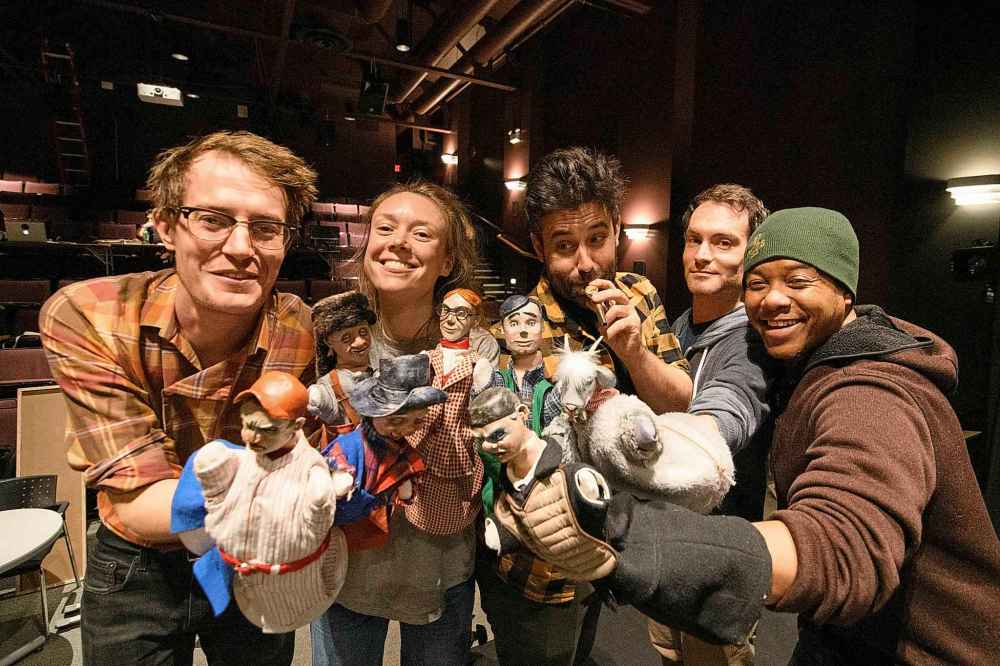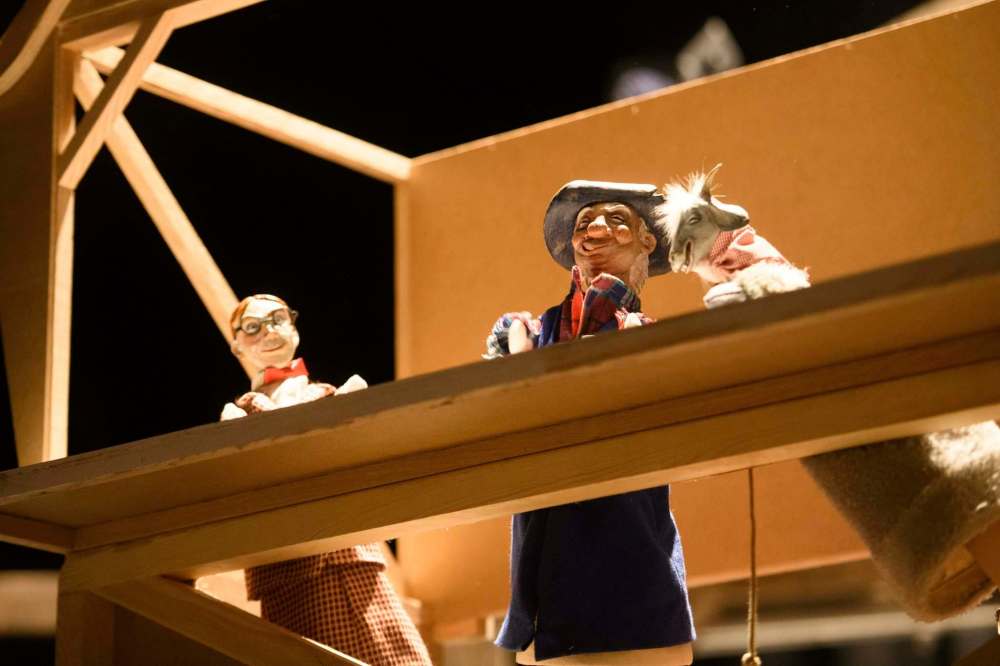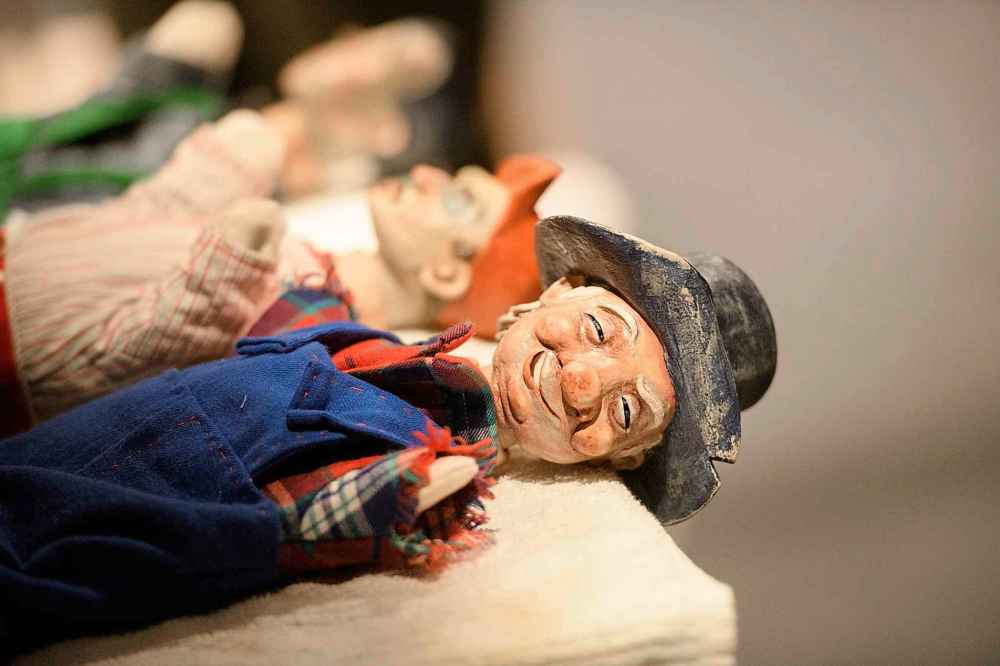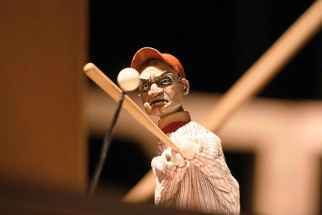Good eye Strong direction, great performances keep baseball puppet play in the strike zone
Read this article for free:
or
Already have an account? Log in here »
To continue reading, please subscribe:
Monthly Digital Subscription
$0 for the first 4 weeks*
- Enjoy unlimited reading on winnipegfreepress.com
- Read the E-Edition, our digital replica newspaper
- Access News Break, our award-winning app
- Play interactive puzzles
*No charge for 4 weeks then price increases to the regular rate of $19.00 plus GST every four weeks. Offer available to new and qualified returning subscribers only. Cancel any time.
Monthly Digital Subscription
$4.75/week*
- Enjoy unlimited reading on winnipegfreepress.com
- Read the E-Edition, our digital replica newspaper
- Access News Break, our award-winning app
- Play interactive puzzles
*Billed as $19 plus GST every four weeks. Cancel any time.
To continue reading, please subscribe:
Add Free Press access to your Brandon Sun subscription for only an additional
$1 for the first 4 weeks*
*Your next subscription payment will increase by $1.00 and you will be charged $16.99 plus GST for four weeks. After four weeks, your payment will increase to $23.99 plus GST every four weeks.
Read unlimited articles for free today:
or
Already have an account? Log in here »
Hey there, time traveller!
This article was published 18/11/2019 (2213 days ago), so information in it may no longer be current.
If you count yourself among the many staunch anti-clown and anti-puppet theatregoers, there’s nothing worse than seeing a puppet show and wondering, “But why puppets?”
Theatre review
The Golem’s Mighty Swing
Based on the graphic novel by James Sturm, adapted for the stage by Marcus Jamin, directed by Mitchell Cushman
● Winnipeg Jewish Theatre
● To Nov. 24
● Tickets start at $15 at wjt.ca or 204-477-7478
★★★★ out of 5
The Golem’s Mighty Swing, which had its world première at Winnipeg Jewish Theatre on Saturday night, raises a lot of questions, but blissfully that isn’t one of them.
The puppets here — as they are in Hand to God, Avenue Q and War Horse — are vital in the telling of this show within a show, disguised as a sport that is also a show, narrated by a puppet who is watching a show performed by actors animating puppets and other inanimate objects to create a show.
It’s all a bit dizzying, like Inception told by puppets, and while not every beat of this unique, ambitious co-production between Winnipeg Jewish Theatre and Toronto’s Outside the March is understandable, it is one of the most thought-provoking works to debut on a Winnipeg stage in years.

Fair warning: this play is not for everyone. But true to the structure of a baseball game, which has always functioned somewhat like a hero’s journey of leaving and returning home, making it a sturdy frame to hang other stories on (the play even has a seventh-inning stretch, complete with a rousing — or terrifying, depending on your temperment — sing-along moment), the pastoral and unhurried place masks a deeper, greater story.
With no major league baseball team in Winnipeg, it can be easy to forget just how important baseball is in the United States. It’s not just a sport, it’s a spectacle. It’s showbiz.
And in Marcus Jamin’s adaptation of The Golem’s Mighty Swing, which was originally a graphic novel by James Sturm, the players on the Stars of David baseball team know that better than anyone.
The Stars of David are a barnstorming Jewish baseball team touring across small-town America in 1922, giving performances in rural venues, such as barns.

When the team encounters unexpected financial difficulties, they receive an offer they can’t refuse. It asks them to compromise their values in exchange for financial reward, but also puts them at risk in other ways: Jim Crow laws were still in effect in the South and racial and religious tensions were high. By using their differences to attract an audience, the Stars of David aren’t only selling more tickets but also stoking the flames of simmering anti-Semitism.
Their latest idea to make a buck is offered by Victor Paige, a Chicago promotor who has recently seen the film Der Golem (which is on YouTube and has a fantastic score, by the way).
A golem, it is explained, is an anthropomorphic entity created out of clay — kind of like a puppet. It’s a figure in Jewish folklore and it can contain a dazzling array of metaphors and symbolism within its little clay body. A golem is often created for help, for protection, but it inevitably becomes something more sinister.
The predominant theme, of course, is hubris.
Paige suggests that the team pretend to have a Golem playing on it and that the Golem should be played by Herschl Bloom. Herschl, also known as Henry, is a black player from the Negro leagues (baseball was segregated until 1946, when Jackie Robinson signed with the Brooklyn Dodgers).
“I’m sure Herschl — excuse me, Henry — will embrace this role,” says Paige. “Negros, after all, are born performers.”

Through embodying the role of the Golem, Herschl and the Stars of David achieve their goal of selling more tickets — but at a terrifying, tragic cost.
Opening night of The Golem’s Mighty Swing was dotted with a few foul balls — there were a few out-of-place sound cues and none of the puppets could seem to keep their arms in their sockets — but the direction by Michael Cushman and the strong performances continued to build the play to a riveting conclusion.
Cushman is also the founding artistic director of Outside the March, a company that specializes in immersive theatre, and likely whom you can thank (or shake your fist angrily at) for the elements of audience participation and interaction.
Cushman clearly enjoys knocking down that pesky fourth wall and playing with scope: in The Golem’s Mighty Swing, he’s juggling stories and characters that shift in distance and focus with an occasionally overwhelming frequency.
Marcus Jamin adapted the graphic novel and also created the puppets. His work has been seen in Winnipeg before in the Royal Manitoba Theatre Centre’s production of Hand to God. But there are no simple sock puppets here.
These puppets are intricate, delicate and full of mystery. They stand on their own but their arms fall off all the time. They look like Japanese Bunraku puppets and Kabuki heads with a Canadian twist. Even those with a puppet aversion will wish they were bigger, as their small scale makes them difficult to see.
Nick Blais’s set and lighting design does as much as it can to support both the puppets and the actors bringing them to life, with a collection of moving carts that fit together in a variety of ways to set the scenes, and tiny pockets of light that seem to cast shadows just as purposefully as they illuminate.
It’s often very easy to draw comparisons when seeing a new play, but here, it’s difficult to think of a close relative. In fact, the work leaves viewers with many lingering ideas and questions… “Why puppets?” not being one of them.
The supporting cast includes Ray Strachan, Jesse Nerenberg, Katherine Cullen and James Smith (who also pulls double duty as sound designer), all of whom embody and animate a variety of puppets and a variety of roles adeptly.

But the show really sits on the shoulders of Toby Hughes, whose puppet Noah (a former Red Sox player) narrates the play. It’s Noah’s world and every emotion of every character in the play is filtered through his mind: if we don’t believe in Noah, we don’t believe in anything.
Hughes, always good in comedies, is absolutely stellar in this role, which calls for an enormous amount of humanity and humility. He gives an authentic, generous and sensitive performance that never overshadows anyone else on stage, despite the fact that he’s present for most of the 105-minute running time (with no intermission).
It’s often very easy to draw comparisons when seeing a new play, but here, it’s difficult to think of a close relative. In fact, the work leaves viewers with many lingering ideas and questions… “Why puppets?” not being one of them.
The Golem’s Mighty Swing is a work of singular vision and ambition, and while it doesn’t hit a home run right out of the gate, we somehow still find our way home.
Frances.Koncan@freepress.mb.ca
Twitter: @franceskoncan

Frances Koncan (she/her) is a writer, theatre director, and failed musician of mixed Anishinaabe and Slovene descent. Originally from Couchiching First Nation, she is now based in Treaty 1 Territory right here in Winnipeg, Manitoba.
Our newsroom depends on a growing audience of readers to power our journalism. If you are not a paid reader, please consider becoming a subscriber.
Our newsroom depends on its audience of readers to power our journalism. Thank you for your support.










